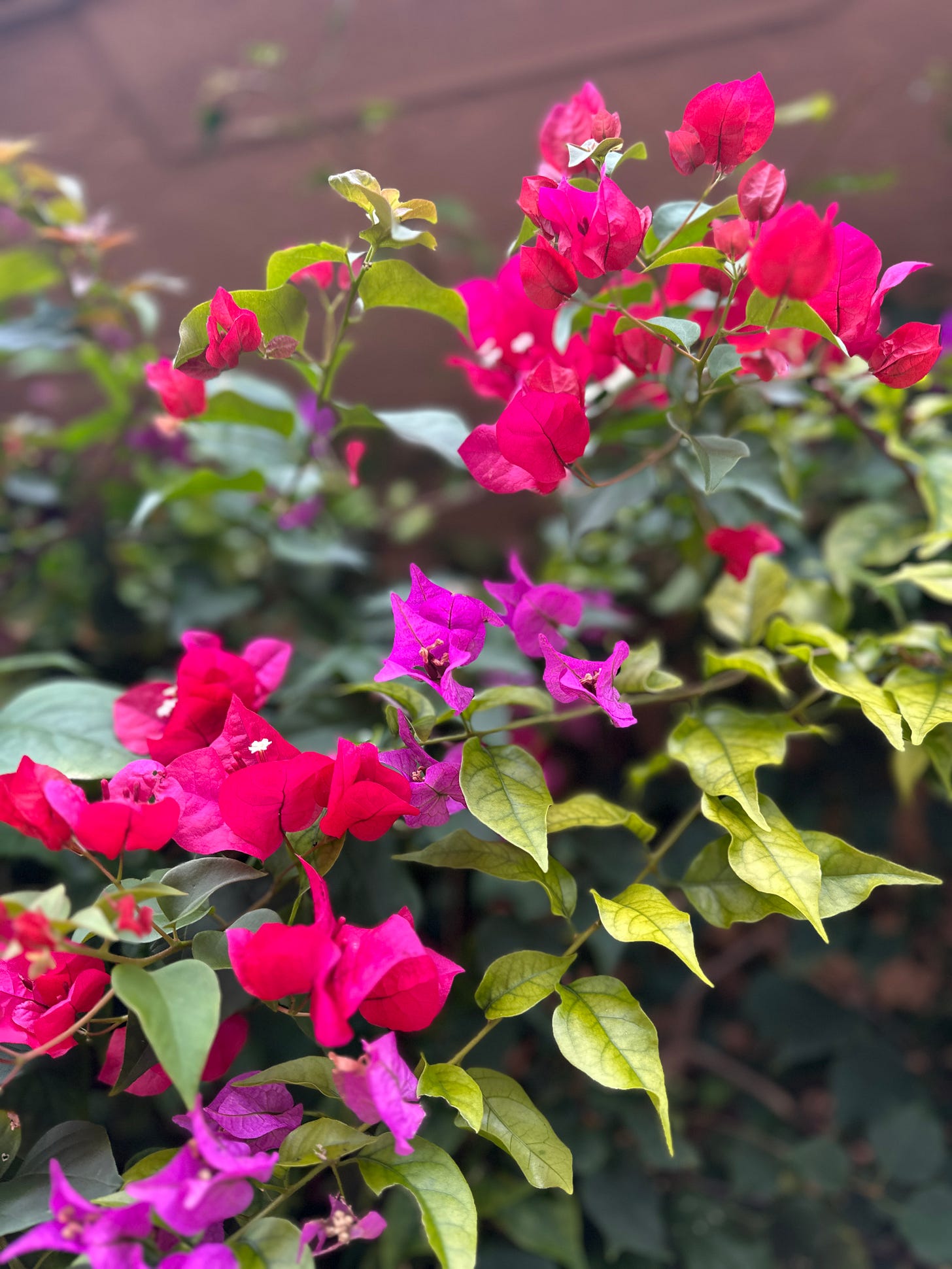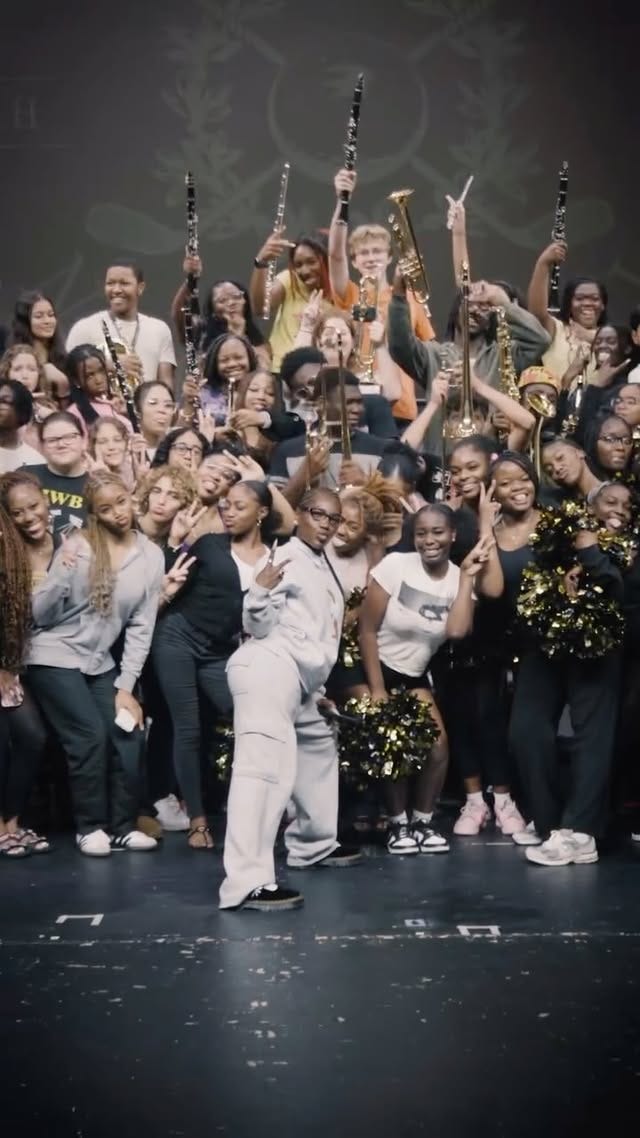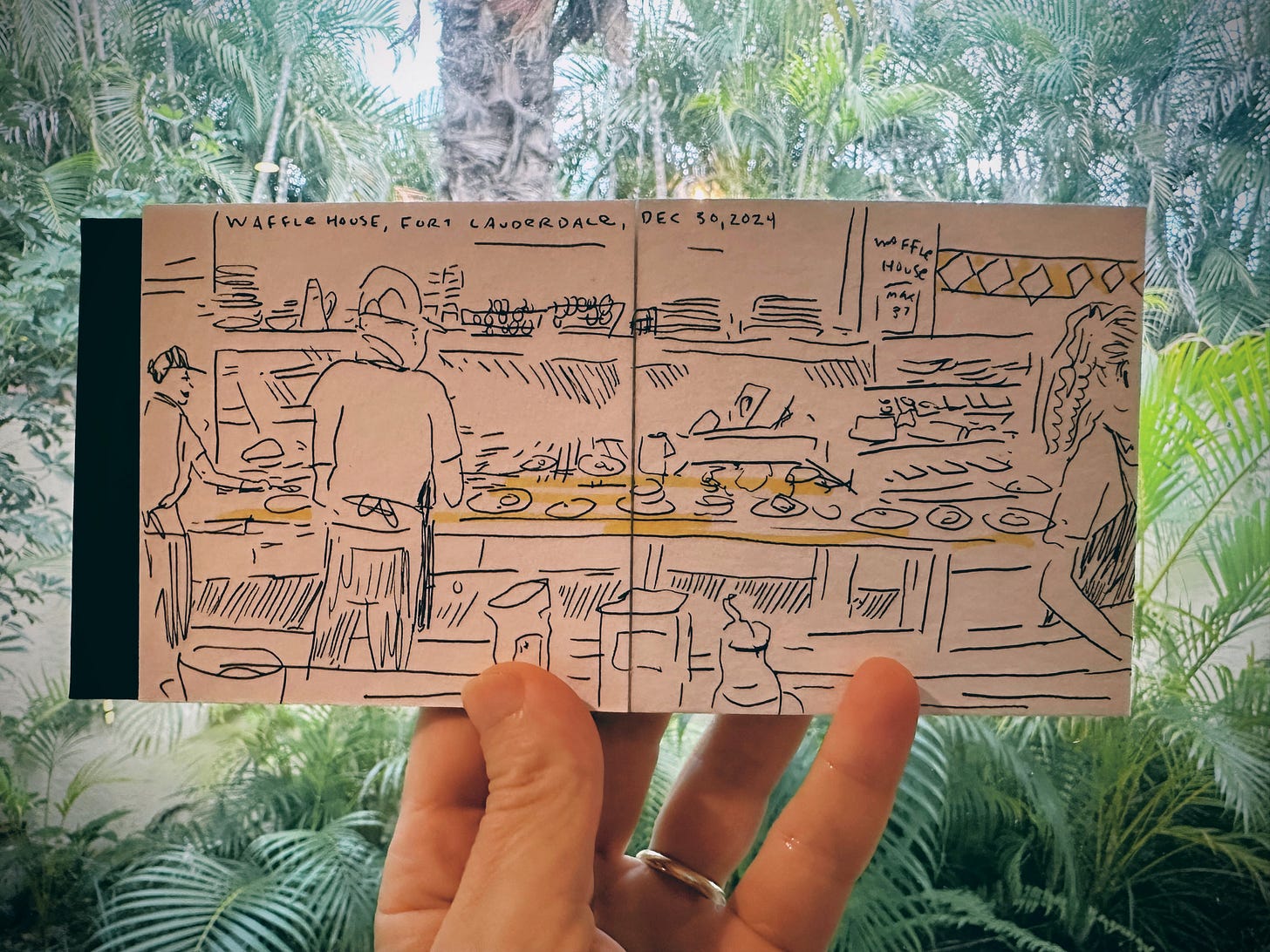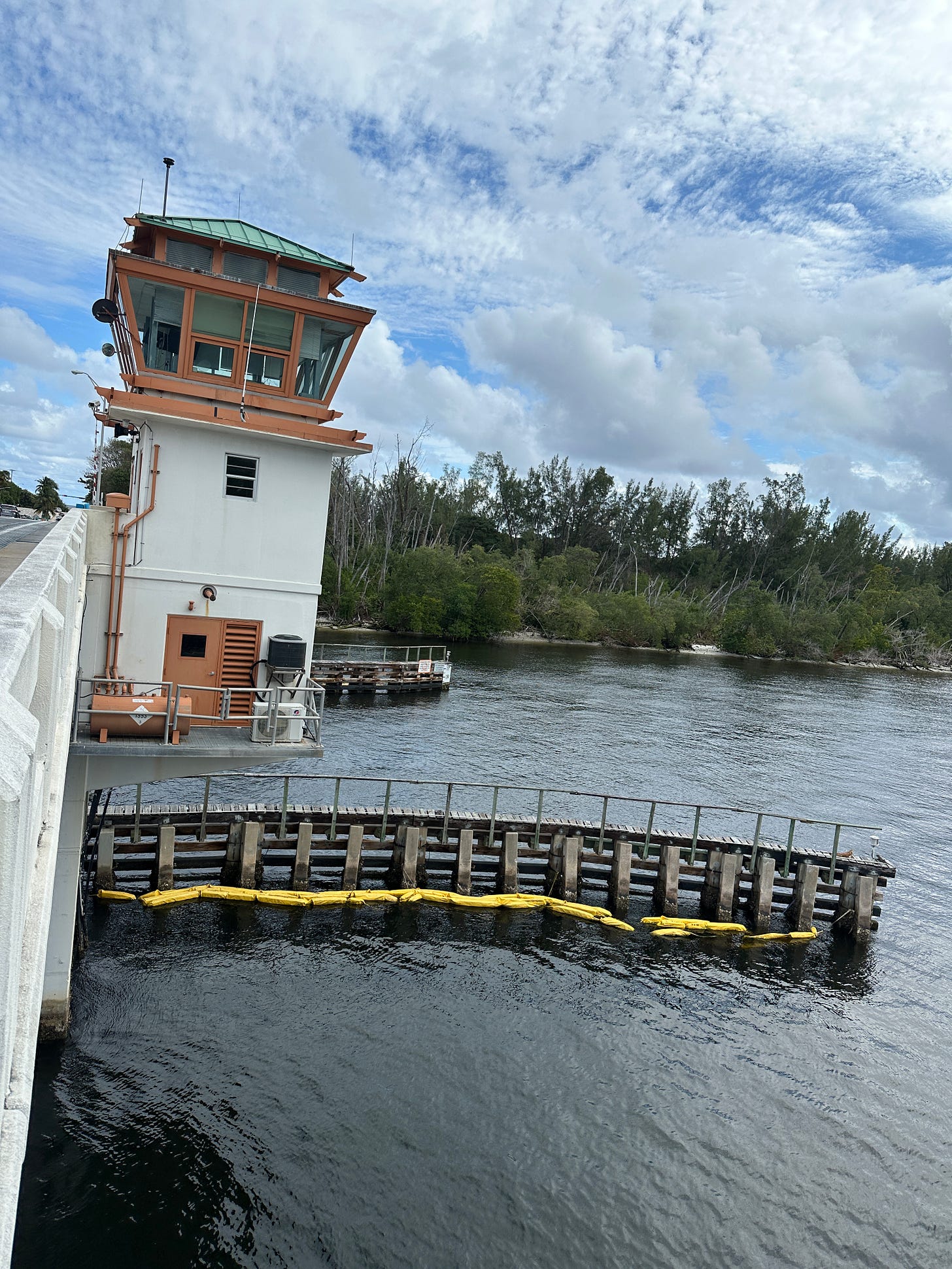Love three ways
Reframe, reposition, refocus.
Hi!
I’m in Florida for a spell. This story greeted my arrival: The race to save the Everglades, and Florida’s drinking water, is on.
I didn’t appreciate Florida nature as much as I could have when I lived here. Maybe that’s why the love I feel for beach cabbage, mangroves, the humidity, and the river of grass herself is so intense — the land is being gobbled up. An ouroboros of swampy self destruction. And yet there are heroic people doing the work. Like Friends of the Everglades. My nostalgia for the Florida I grew up in extends to the political climate, too. Once, these swamps weren’t MAGA-filled — they were conservative (you can’t spell mangrove without man!) to be sure, but there was a politics of conservation, and stewardship. What would Marjory Stoneman Douglas have made of all this? She’d have had some words, no doubt.
But enough of all things brackish and hackish, this month’s newsletter is about love. ♥️
A half-decade ago I met some curiously brilliant non-profit marketers called Potential Energy Coalition. They were working on a bunch of climate campaigns that sought to reframe how we message climate, based on actual! testing! It was widely novel at the time. One of their first campaigns was Protect What You Love, and it was a mashup of everything I’d learned from a most incredible environmental psych prof, Clara Dolderman, coupled with what we know to be true from moral foundations theory — protecting is powerful stuff. Protecting the things we love about the world is the powerfulest.
I’ve come back to love as the key operating frame time and time again in this newsletter, so instead of rehashing, I’m recombobulating all my thoughts on love here, as inspired by so many excellent people:
💚 Reframe: Climate work is love.
💚 Reposition: Love is greater than positivity.
💚 Refocus: It’s not everything you love, but something you love.
1. Climate work is love.
A while back I fell in love with these beautiful words from the excellent Cat Abreu. This is from a 2020 post I wrote on reframing climate work as not oppositional, but loving, about fighting in the most positive sense. Writes Cat:
The truth is that working on climate change is not a fight: it is an act of love. Those of us who dedicate our lives to this effort, in whatever setting we choose to work (there are climate activists in governments and businesses everywhere), do it because we love our families, our children, the lake we swam in as teenagers, the communities we have seen suffer as weather gets more extreme and sea levels rise. We do it because we see the injustice and inequity and colonial ideology that both drives and is exacerbated by climate change, and we have to believe in a world liberated from these institutions of violence.
People see just about anything oppositional as a fight. But battling the status quo doesn’t mean you are fighting against something (fossil fuel jobs, pipelines, bechamel sauce) so much as fighting FOR something. And if you’re fighting FOR something it’s because you love it, believe in it, care about it. In which case, you don’t need the language of battle at all. You are advocating, championing, building, supporting, cheering, encouraging, spelunking, twerking, vibrating with love.
(Cat Abreu: Climate action is my love language.)
2. Love > positivity.
Love is a great way to sidestep the climate positivity convo. It’s hard to be positive, and it often feels off, because although we’re making huge strides, we can see (and experience) the devastation already (some much more imminently than others), and there are headwinds aplenty. Which is why I’m tired of the positivity conversation, whether you affix a ‘toxic’ in front of it or not. Same goes for hope, despair, and hydrogen. Can we just not?
If we need motivation though, love is what compels (and survival, of course). And imagining the fate of the people and and places we love is meaningful, and effective. A new study affirms the merit of future positioning by way of exercises like Dear Tomorrow, a fave project of mine, that asks you to write to the future, or yourself. The intervention, future self continuity, is so powerful that it proved the most effective technique in support for climate policy in this neat megastudy: Addressing climate change with behavioral science: A global intervention tournament in 63 countries.
The most effective strategy globally was imagining writing a letter to a child one knows today who would receive the letter 25 years later, explaining one’s climate actions today. Similarly effective was imagining oneself in the future writing a letter to one’s current self, asking questions about what actions one took or what one was thinking at the time.
“These messages shrink the timescale of climate change. They remind us that our actions today matter and will impact people we know, in our families and communities,” Pearson says.
This ‘leave what you love for future generations’ is done SO EXPERTLY in this season of the TV show Hacks, (ep 5), when young writer Ava schools veteran comedian Deborah. It hits on so many other things I think about all the time, too (how the climate crisis is a crisis of existential magnitude unlike anything that has come before it, even if you’re old enough to remember very bad things!), but it’s really about respect, which is a form of love for all humanity.
Ava: Okay, you know what? Joke all you want. But you drive cars that are inefficient. You take a private jet everywhere.
Deborah: Not everywhere.
Ava: All the stuff that you sell on QVC, it’s all plastic and fast fashion. Polyester doesn’t degrade. It’s made from oil. Okay, Forever 21 is basically Exxon. Zara–BP.
Deborah: Listen, I’m not saying you’re wrong. It’s just that young people are just so much more dramatic about everything. When you live long enough, you realize things don’t change that drastically.
Ava: Okay, think of it this way-when you play a comedy club, you don’t do the shitty material at the end of your set and leave the crowd cold out of respect for the comedian following you, right?
One tiny extra thing I love about this scene: you don’t have to have kids. Often people say they’re doing climate work for their children, which is lovely, but also leaves out a whole lotta people (and if I’m being honest, feels weird — no kin, no care?) who don’t have kids, and still want to do right by the world. Leave it nicer than you found it, progeny or no, it’s all valid. And universal.
3. Focus on what you love.
It’s not everything you love, but something you love. (From Love people in Nature, MVP 2022.)
In 2013 my favourite professor, environmental psychologist Clara Dolderman, gave a TED Talk in which she said the climate crisis was about Everything You Love. This phrase, which I fell in love with (meta much?) has hummed in my brain for nearly a decade. I wrote about it in my newsletter a few years ago, And I think everything I said, and Clara preached, still holds up, with one absolutely key change — It’s not Everything You Love, It’s Something You Love. Everything you love is a vaseline-lensed montage of the greatest hits of your life that you can’t grab onto. It’s a hyperobject itself, too big to comprehend. Something you love is a moment, a conversation, a party, a game, an embrace that you call up with a vivid clarity that sticks. It’s that singular love, situated in, but not secondary to “nature,” that motivates the action we need to inspire climate care.
How do we find the single thing that will motivate climate caring and, ultimately, climate doing? Love helps. An ability to find that clarified, singular, loveable motivator and tie it to doable things helps, too.
We ran a 10K in a torrent yesterday. At the finish line, a woman came up to me and thanked me for pacing her. I hadn’t noticed, but it felt nice to have been a useful focal point, helping someone else to achieve their goal. I hope to leverage my love to focus on the things that matter this year. Like being kinder, training my energy on the people and projects that matter most, and adding light to the world where I can. While eating cookies.
2024 has been rough, personally and planetarily. I wish you a fresh year full of new energy and the animating love you need to do what you want this year. What are your goals and dreams? Or non-goals and non-dreams (maintenance is lovely, too)?
Stuff
💚 New internet friend Shreyas has a newsletter exclusively about heat pumps, or as he, and many others, propose we call them, 2-way ACs. I’m on side from a cooling standpoint. For heat, how can you do better than the words heat pump? Maybe magic cozy heating machine?
💚 The good news lists feel impoverished this year, even though LOTS of incredible things happened. Rather point to the inevitable market markers that say this clean energy transition is happening regardless of tin pot pompadours and backsliding baddies?
💚 RIP Jimmy Carter. We’ve tried to undo his sweater efficiency for years — but he will be remembered fondly for it in the end. I’ve always associated Carter with The Sweater Song, because we do want to destroy the sweater…even as we need to wear it. It’s a song about sadness that reads as hilarious. A sweater on your person or furnace feels similar. Yet someday, we will all wear the efficiency sweaters. Rest in peace.
💚 Loved this Semafor All the Things We Got Wrong in 2024 post.
💚 What about a little climate hope? Sure. Some things are easier to undo than others — like light pollution and plastic pollution…This is beautiful, from The Narwhal:
My experience isn’t that uncommon, Michelle’s story confirms: as of 2016, 80 percent of North Americans couldn’t see the Milky Way. Since then, the night sky has become even more saturated by artificial light — about twice as bright as it was eight years ago. It’s a type of environmental degradation that’s not as obvious, but light pollution impacts creatures like bats, sea turtles, songbirds — and humans, too.
For the Huu-ay-aht, everything is connected. It’s why the First Nation is on a mission to protect its stars, and even developing a dark sky festival — which it hopes will bolster economic development, preserve astronomical traditions and draw attention to our endangered, irreplaceable view of the stars.
“Artificial lighting is not an oil spill or a felled tree,” Michelle writes. “Unlike other forms of environmental devastation, we can undo much of it with the flick of a switch. It might not be so simple as that, but it’s possible to restore some of what we’ve lost, and protect what we still have.”

People dancing
Florida gal Doechii visits her Tampa high school and you don’t wanna miss it!
The charm and the commitment.
Happy New Year! Wishing you health, happiness, and heart,
Sarah
PS. Heat pumps on bridges. Yes, please.











These newsletters are just the best Sarah. :)
Thank you for the Weezer reference (song stuck in my head now), and for quoting this wonderful use of language:
"Everything you love is a vaseline-lensed montage of the greatest hits of your life that you can’t grab onto."
Thank you for your article, especially reminding us to love and focus on something instead of trying to do it all.